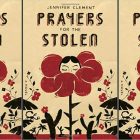The Ploughshares Round-Down: Is It True You Can’t Make Any Money Writing Books?
When I was making the switch last year from being an editor to being an agent, I heard from older agents that I was making a huge mistake. Advances are shrinking, they said. Midlist authors are going without contracts, and everybody is self-publishing. The whole industry is falling apart! One suggested I should find a different line of work altogether. From where they sit, with Borders out of business and Netflix sucking up mindshare, I can see how their office starts to look like a handbasket where it’s getting hotter every day.
It’s not just agents who tell me this sort of thing. I’ve been reading for two decades about all the ways publishing is dying. In fact, the most interesting thing I’ve read in the last two weeks carries this as its subhead: “The credit crunch and the internet are making writing as a career harder than it has been for a generation.” The article, in The Guardian, draws this conclusion based on the experiences of two financially struggling British novelists, Joanna Kavenna and Rupert Thomson—and it is possibly the most wrong-headed thing I’ve ever read about book publishing.
What’s Gone Down
The article uses these authors’ declining advances to assert that few writers are making money anymore. I’m sympathetic to both writers. I haven’t read their books, but the reviews make them sound appealing. And I have a car payment mortgage and kids and I could use a new pair of sneakers. Who wouldn’t like to get paid more for their work?
However, the article leaves out the most important detail. What did these books actually sell? Both are advertised in the headline as bestselling novelists, yet the article never mentions any specific bestseller lists, or any specific sales figures. What both writers have actually done is get an advance north of $150,000, generate alarmingly low sales, and fail to find anyone to pay them that large a sum again.
So all that is really happening here is that publishers are trying to pay people what they’re worth.
Some Writers Don’t Deserve Six Figure Advances
A book advance is money paid to a writer against expected future royalties. It’s not a prize or a grant. It is a business transaction. For the two writers in the article, I looked into what their U.S. sales were like, and it’s not even clear that either has sold enough copies of their books in the last ten years to qualify even as “midlist.”
Editors have to possess all sorts of skills, but the most important part of the job is reading a manuscript or proposal and being able to say: “This book will sell this many copies.” An editor can be great at all kinds of other things, but if you can’t get that right, nothing else matters. An editor decides if a book looks worth investing in, and then she tries to convince her team (marketing, sales, other editors, VPs, publicity—it depends on the house) that the book will sell at least that certain amount of copies. This is based on things you’ve heard about, like the quality of the book, the author’s platform, the riskiness of this shelf, and sales numbers for similar titles.
A few crunched numbers and sign-offs later, and the editor puts an offer on the table. If you always bid too high, your imprint loses money. If you always bid too low, you don’t get any books.
How Does The Advance Thing Work, Exactly?
How do advances get calculated? Let’s look at three different examples. For simplicity’s sake, we’ll say each “unit” of sales earns about $3.00 in royalties. So, if book one might be a strong midlist title, appealing to a good but niche audience, let’s guess it will sell 10,000 copies—so we’ll offer a $30,000 advance.
Let’s say book two looks like it will reach a wider audience—maybe this writer has had two pieces in The New Yorker—and it will do very well among a certain kind of reader. It may even skim the bottom of the bestseller list and make a few end-of-year lists. We project it will sell 25,000 copies in hardcover, so we’ll offer a $75,000 advance.
And let’s say book three is so funny and touching and universal that it’s going to be read in book clubs and it will definitely make a bestseller list, though maybe only for a week or two, and maybe there will be translation rights and a long life in paperback and so we’ll call it 60,000 copies, and go up to $200,000 for it.
Unfortunately, I would guess that industry-wide only one in thirty books actually earns out—so odds are all three of these books will go on to sell about 2,500 copies. Whoops!
It’s Like They’ll Let Anyone Do This
Remember when I said that if you can’t properly price a book, you’re not going to last as an editor? Man, that drives people crazy. There are a lot of people in the business that remember when the things that mattered were your major at Harvard, which parties you were invited to, and the Paris Review. And those people are not happy about Kindle, Twitter, and Buzzfeed, because it makes what they do that much harder.
And so, with the conversion of publishing companies to competitive enterprises, you end up with people like me becoming editors. All I ever wanted to do was read and talk about books. But I went to an iffy college. My father was a plumber. I like to read business books, and I used to openly discuss making more profits for my company and generating more sales for my authors. I like all kinds of books, but I only want to work on the ones that will sell.
In short, I’m the villain in every article you’ve read about how publishing is terrible now. I’ll never ignore the bottom line.
But the article in the Guardian completely missed the positive side of this approach to publishing. The industry isn’t dying; it’s just turning into a more effective meritocracy. The authors who can’t make money writing aren’t in that situation because their slot disappeared—they’re in that situation because their slot has been taken up by someone else more popular. Probably it went to another author who’s actually quite similar, but just better at what she does.
In fact, there are lots of writers out there still getting six figure deals. Just four months ago there was a first-time novelist who made headlines by getting a $2 million advance for his debut literary novel. I only hope, for the sake of everyone involved, that the acquiring editor priced that advance correctly—and that his isn’t one of the many books that ends up selling 2,500 copies.



